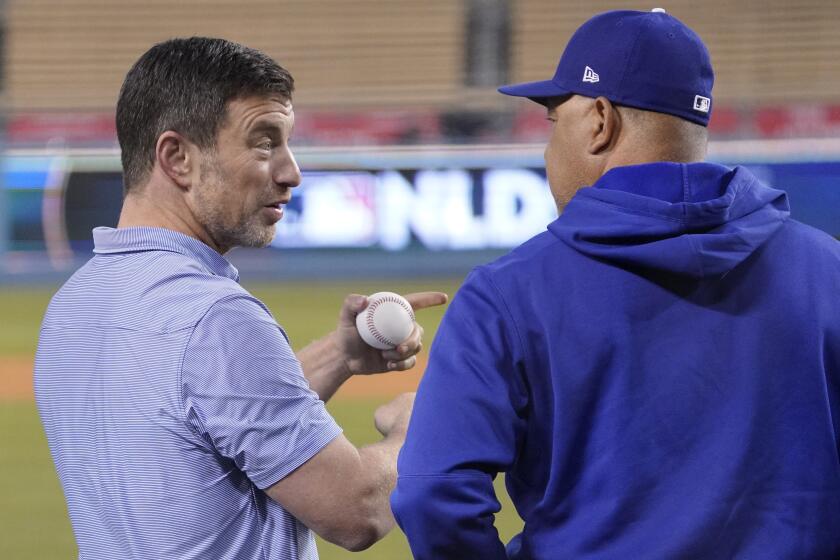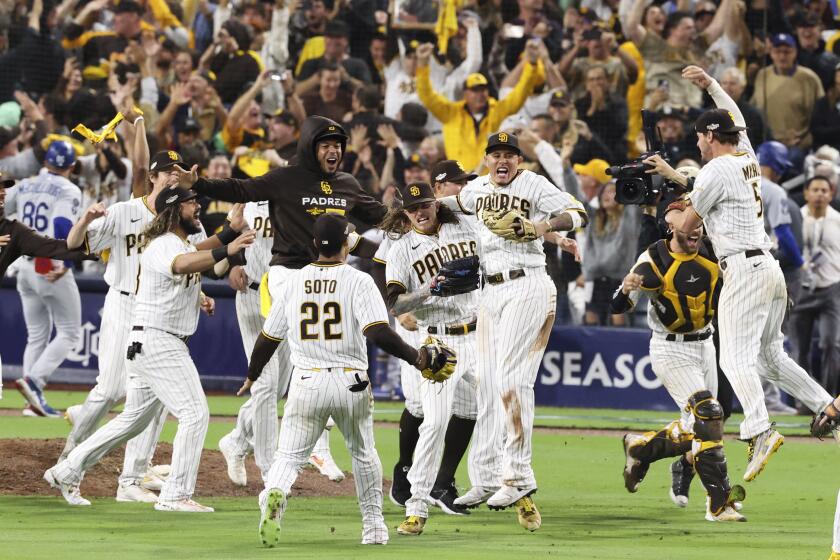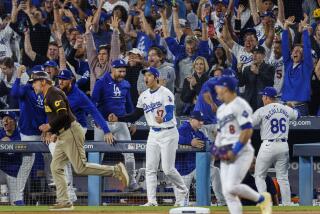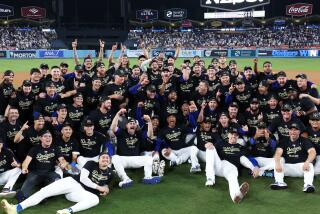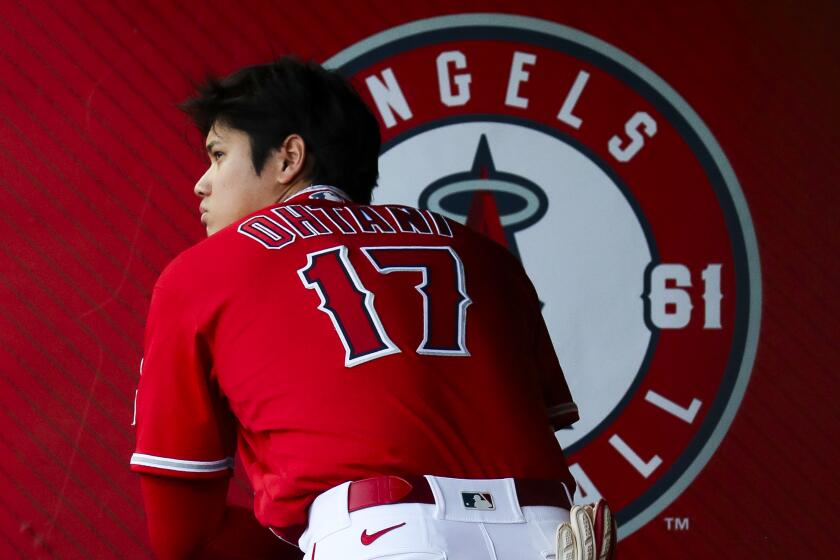Column: Dodgers go from biggest winners to biggest losers with worst upset in their history

SAN DIEGO — They have flopped before, countless wonderful summers cruelly melted into autumn ashes.
But they’ve never blown it like this.
They have been embarrassed before, many memorable summer marches ruined by staggering October stumbles.
But they’ve never been humiliated like this.
Barely a week after setting a franchise record with 111 regular-season victories, the biggest winners in Dodgers history have blundered into a vastly different moniker.
The Biggest Losers.
A Dodgers lead in Game 4 of the National League Division Series vanished amid poor execution and puzzling decision-making in a 5-3 loss to the Padres.
On a rare rainy Saturday night at San Diego’s Petco Park, an even stranger event occurred — the sight of the San Diego Padres dancing across the field after sucker punching the Dodgers into next season.
Little brother has knocked out big brother. The nail has spiked the hammer. The shadow has eclipsed the sun.
In a 5-3 comeback victory, the Padres clinched the best-of-five National League Division Series three games to one while sending the Dodgers to the darkest corners of their legacy.
This is the biggest disappointment in Dodger history. This is the biggest upset in Dodger history. In strictly a baseball sense, this is arguably the lowest point in Dodger history.
“Shock factor, very high. Disappointment, very high,” said manager Dave Roberts. “It’s crushing.”
The crush was finalized with a strikeout of Freddie Freeman, a stadium-shaking roar from the crowd, a giant infield hug by bouncing players, and a taunting sprint around the bases by pitcher Blake Snell while holding — what else? — a ceramic goose.
The Dodgers have never been this cooked.
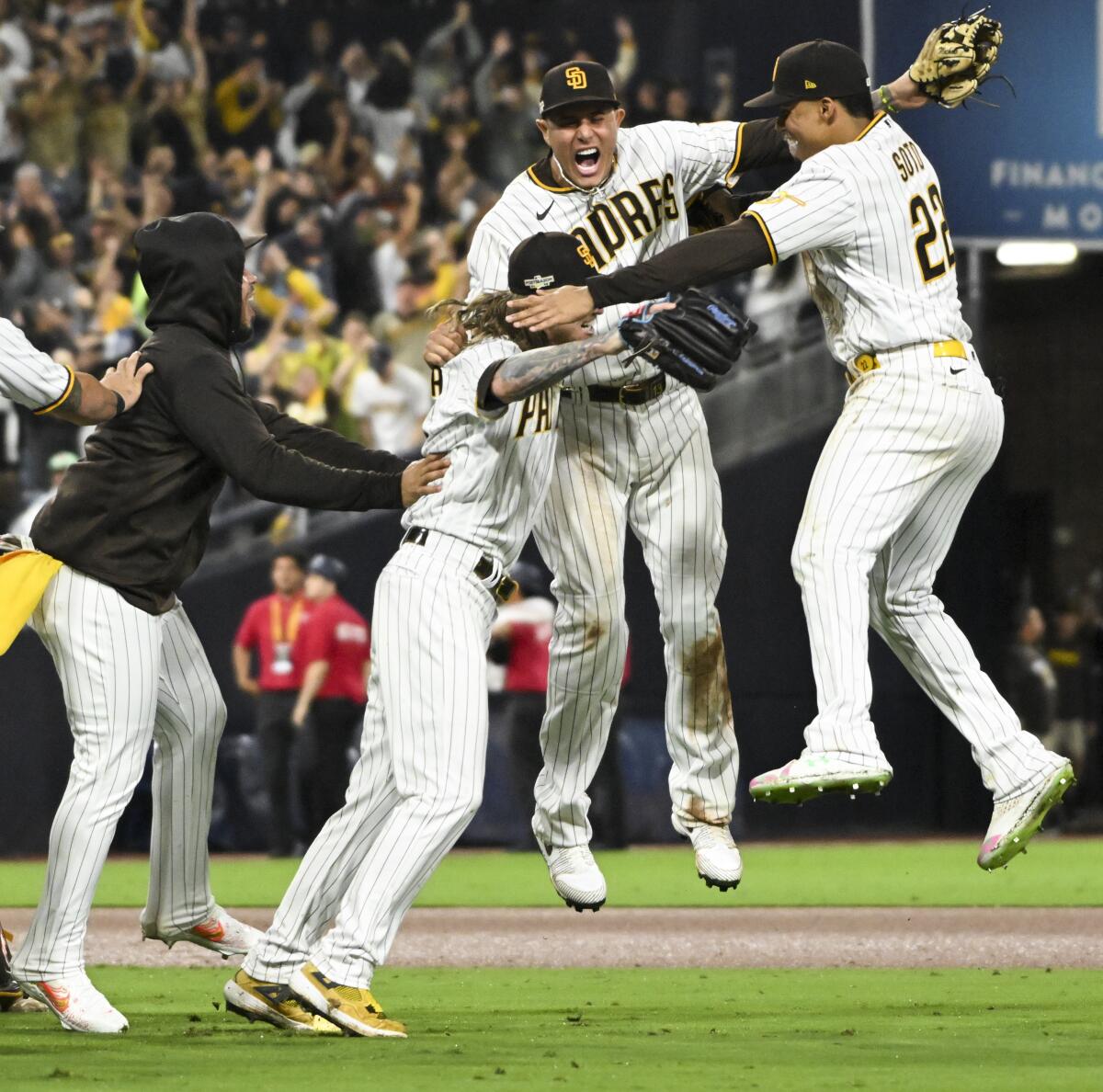
Little brother has knocked out big brother. The nail has spiked the hammer. The shadow has eclipsed the sun.
They won more regular games than all but three teams in major-league history, yet their postseason lasted all of four nights. The Dodgers won 22 more games than the Padres during the long summer, yet they could beat them only once in four October tries.
Based on difference in regular-season winning percentage, this was the second-biggest upset in postseason history, and the biggest in 116 years.
The Petco chants of “Beat L.A” and the sight of thousands of flapping yellow towels will live in Dodgers lore forever. So will the sight of the league’s best offense spinning and staggered, the sight of the league’s best bullpen lost in confusion, the sight of the league’s most powerful franchise over the last decade crumbling under the pressure.
Again.
Ten postseason appearances, nine postseason failures.
Nine West Division championships, and just one World Series championship, in a COVID-shortened season of just 60 games, the 2020 title looking more deserving of an asterisk with each passing nightmare.

“Yeah, there’s certainly fans that are going to think it was a wasted season,” Roberts said. “I don’t think there’s anybody in our clubhouse, in uniform or with the Dodgers, that feels that way. But ... yeah, this one hurts.”
This is bad. This is real bad.
It ended worse Saturday than one could possibly imagine as an array of relievers from the Dodgers’ revolving bullpen blowing a 3-0 lead by allowing five Padres runs in the seventh inning.
The first run was plated on an Austin Nola grounder that handcuffed first baseman Freddie Freeman. The second run was driven in on a scalding grounder down the third-base line past Max Muncy by Ha-Seong Kim. The third run scored on a line drive to right by Juan Soto.
Then came the go-ahead hit, on a two-out, two-run single by Jake Cronenworth against Alex Vesia as the crowd bellowed a roar that could surely be heard south to the border, and north to Chavez Ravine, and anywhere Dodgers fans were hanging their head in familiar disgust.
Dodgers manager Dave Roberts doesn’t deserve all the blame for the Dodgers’ season ending in grim fashion. Andrew Friedman also needs to be scrutinized.
After the hit, after the loss, after the Dodgers and their wet uniforms disappeared into the night, the focus returned squarely to Roberts.
Yeah, him again. The man who has been perceived as the villain in so many of these collapses will take the heat again, questioned all winter for the decisions that led to that fateful inning.
First, why was Tyler Anderson pulled after five innings of a two-hit shutout? Then, with the bases loaded and none out in the seventh after a walk and two singles against Tommy Kahnle, where was top reliever Evan Phillips? Why did Roberts bring in Yency Almonte instead?
Then, after two runs had scored and Cronenworth came to the plate with runners on second and third and two out, why did Roberts allow Almonte to throw one pitch — a ball — before bringing in Vesia, who gave up the game-winning double moments later? And again, why wait until the ninth inning to bring in Phillips?
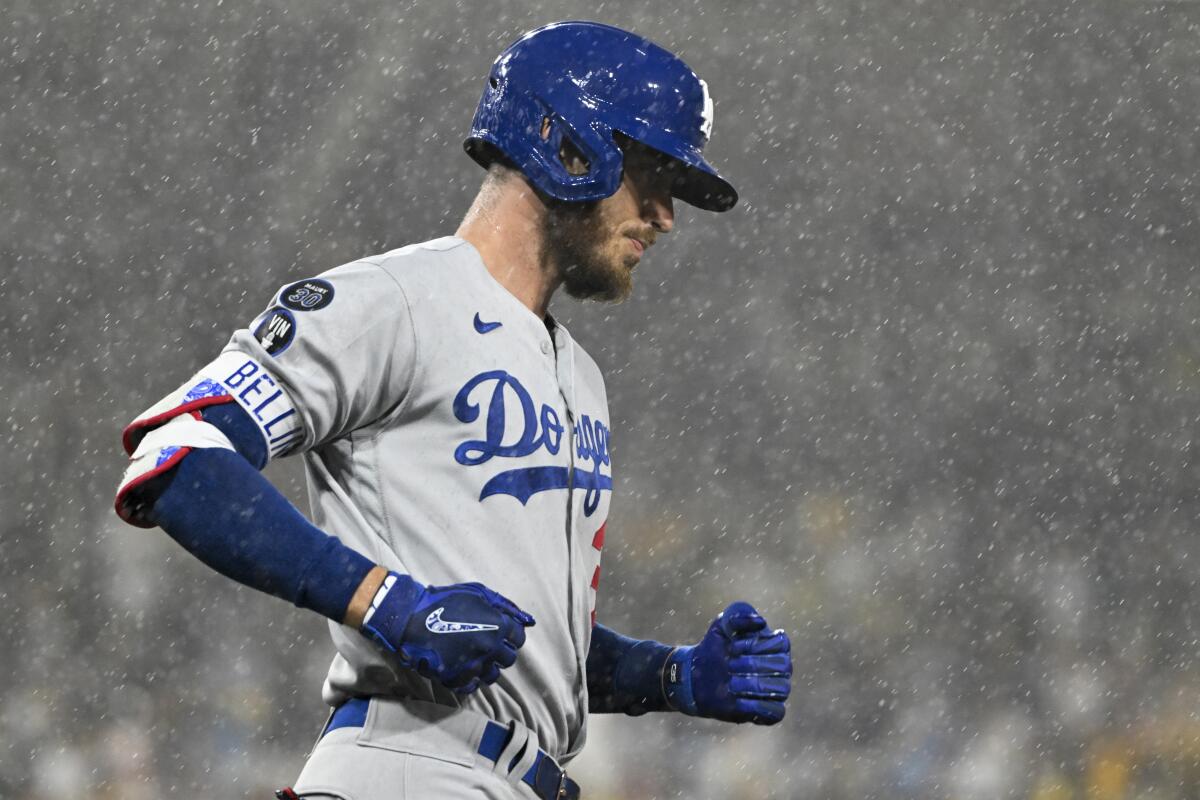
This is the best example of why many fans have been unable to enjoy the six months of winning without waiting for the other shoe to drop.
Through all this, how was Juan Soto allowed to stroll to second base without a throw just before Cronenworth’s hit?
Afterward Roberts explained that Almonte wasn’t supposed to make that first pitch to Cronenworth, he was supposed to throw over to first, but the sign was never picked up.
“I don’t know how it got lost in translation,” said Roberts and one must wonder, with a million coaches and advisors, how can the Dodgers lose something in translation?
Roberts said he was saving Phillips to finish the game, but isn’t finishing a high-leverage situation more important than finishing the game?
Roberts was particularly biting about Kim’s double past Muncy, saying, “Muncy could have fielded it, it could have been a double play, but it wasn’t meant to be.”
There’s nothing Roberts could say about any of it, really. It’s all been said before. It’s all been seen before.
This painfully punctuates the narrative scripted by the Dodgers postseason failures during their past 10 years of regular season domination. This is the best example of why many fans have been unable to enjoy the six months of winning without waiting for the other shoe to drop.
And this time that shoe belongs to the San Diego freaking Padres?
This is worse than Clayton Kershaw’s meltdowns against the St. Louis Cardinals. This is worse than Corey Seager failing to cover third base against the New York Mets.

This is worse than being overrun by the Chicago Cubs. This is worse than Howie Kendrick’s grand slam for the Washington Nationals. This is worse than the front office’s pitching mismanagement against the Atlanta Braves.
This is even worse than being cheated by the Houston Astros in 2017 and being whipped by the Boston Red Sox in 2018 because, well, at least both of those defeats were in the World Series. In each of those years, at least they won two playoff rounds.
“They all suck,” said Justin Turner, who has lived through them all and contributed but two hits in this series. “Obviously the goal is to win a championship. To fall short of that in any round doesn’t matter.”
This time, even with the greatest run differential in baseball in 83 years, the Dodgers couldn’t even win two playoff games.
“Yeah, it sucks, it really sucks, you know?” said Chris Taylor, who went hitless in his only two games in the series. “Every year you don’t win, it’s really hard. We always expect to win, so this is nothing new. We’ve been here before. Never feels any better. Feels the same.”
And to think, this was going to be the season the story finally changed. This was going to the season they would overcome the stigma of the one shortened-season championship. This was the season they were going to win a World Series after a full season for the first time in 34 years.
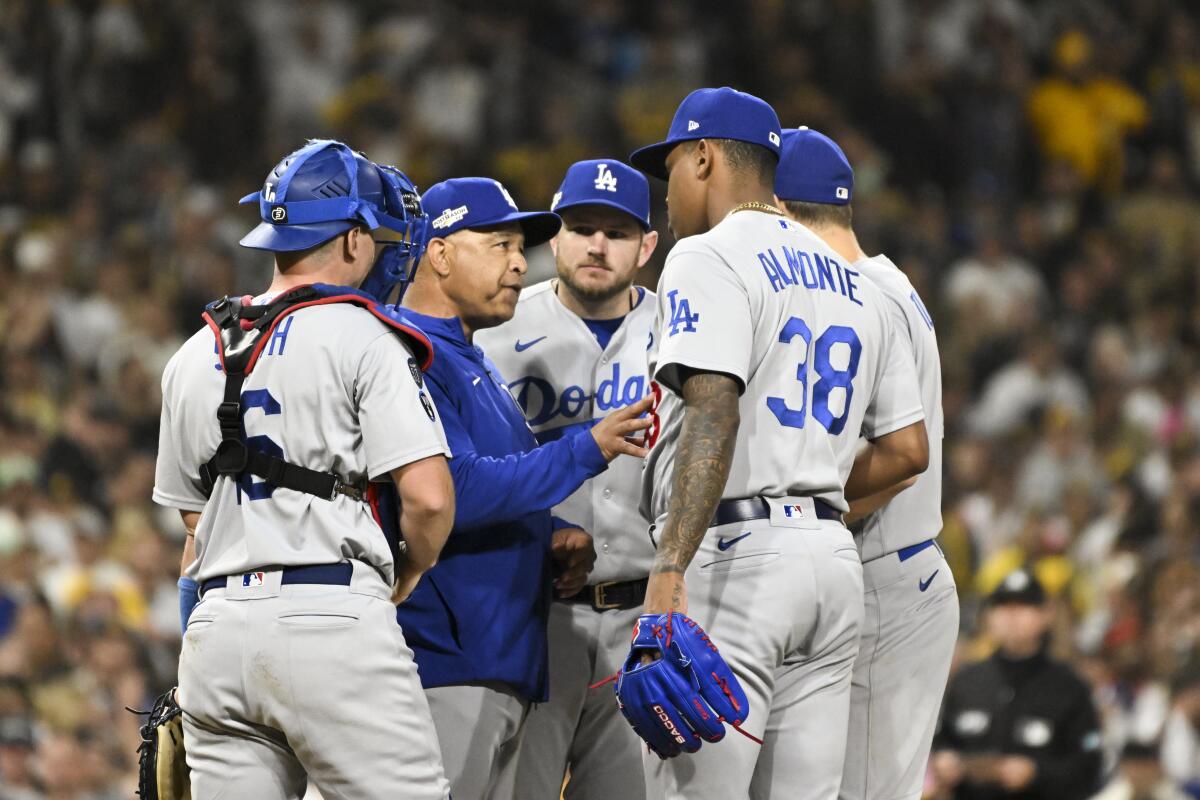
This was a Dodgers team so loaded that back in March, Roberts guaranteed a World Series championship on “The Dan Patrick Show.”
“We are winning the World Series this year,” he told Patrick. “Put it on record.”
Put those words in the trash, along with every other belief about this supposedly greatest of Dodger teams. Finally confronted with the sort of playoff pressure that was missing during their steamrolling summer, the Dodgers cracked against a Padres team playing its best baseball with nothing to lose.
The starry Dodger batting order led by the Big Three of Mookie Betts, Trea Turner and Freddie Freeman? Only Freeman consistently showed up.
The once feared Dodger pitching staff led by Julio Urías and Clayton Kershaw? The Padres knocked around Kershaw and then took advantage of a thin collection that wasn’t built to compensate for the loss of ace Walker Buehler, and injury-weakened Tony Gonsolin, Dustin May and Blake Treinen.
Everything you need to know about how the Dodgers’ 2022 season ended in a four-game loss to the San Diego Padres in the National League Division Series.
The professional Dodger fielding? A botched grounder by Trea Turner basically cost the Game 2, and they never seemed truly sharp again.
Meanwhile, the Padres advance to the National League Championship Series in a battle that will highlight a renewed franchise that has truly fought its away out of the big blue shadow.
“I think it’s about time that we start talking about San Diego as a sport town,” said former Padres pitcher Jake Peavy. “We’ve lost the Chargers. This is the only game in town. The Padre fans are absolutely showing out, from Del Mar on down ... it feels good. It feels electric.”
As for the Dodgers, well, for the ninth time in 10 years, they’ve turned out the lights early.
But it’s never felt this dark.
More to Read
Are you a true-blue fan?
Get our Dodgers Dugout newsletter for insights, news and much more.
You may occasionally receive promotional content from the Los Angeles Times.


